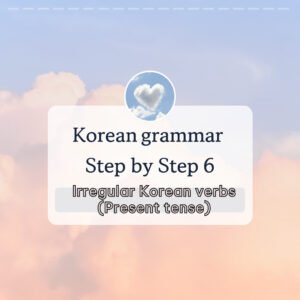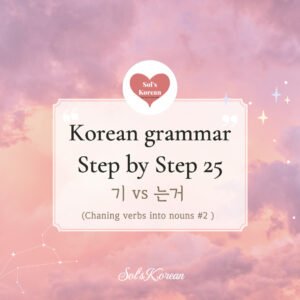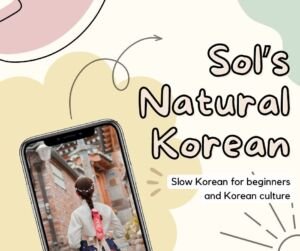Everything About 는데 grammar
Hello, everyone!
Today, we will be learning one of the crucial connectors in Korean grammar: 는데 grammar!
We’ve studied 고, 아/어/해서 connectors so far, meaning “and” or “because”
The particle 는데 is a versatile connector in Korean that links clauses, providing additional context, contrast, or background information. It is commonly used in both spoken and written Korean and can be roughly translated to “but,”or “by the way,” depending on the context.
I will explain each point step by step to facilitate understanding.
So just follow along with me!
Part 1,
Let’s grasp the concept of grammar
(1) 는데, ㄴ(은)데: But
The first usage of 는데 is “But”.
Because 는데 is a shortened form of 근데 (but).
When you combine a verb with 근데, it becomes Verb + 는데.
I like you, but I like Suji too.
나는 너를 좋아해. 근데 수지도 좋아해. (informal)
-> 나는 너를 좋아하는데, 수지도 좋아해 ( 해 + 근데 becomes 하는데)
Let’s take a closer look how to form this!
How to Form “는데”
The usage of 는데 changes slightly depending on whether the verb stem ends in a consonant or a vowel, or if it’s an adjective.
Let’s see how we can form 는데 with verbs
Verb Stem + 는데
Simply drop the verb ending “다” from the original verb and add “는데” (present tense)
먹다(to eat) -> 먹는데(I eat, but)
전화하다(to call) -> 전화하는데(I call, but)
만나다(to meet) -> 만나는데(I meet, but)
No need to conjugate! just like “고” grammar, we will add ‘는데’ to the verb stem.
Irregular
살다, 만들다, verbs ending in “ㄹ” final consonant, we will drop “ㄹ” and add “는데”.
살다(to live) -> 사는데(I live, but..)
만들다(to make) -> 만드는데(I make, but…)
재미있다 (to be interesting), 맛있다(to be delicious). Ending in “있” adjectives, despite being adjectives, we add 는데 directly.
재미있다 -> 재미있는데 (It’s interesting, but..)
맛있다 -> 맛있는데 (It’s delicious, but..)
Example:
한국에 사는데, 한국 사람은 아니에요. ( I live in Korea, but I’m not Korean.)
*살다(to live) + 는데(but) -> 사는데
비가 오는데, 우산이 없어요( It is raining, but I don’t have an umbrella.)
* 오다(to come) + 는데(but) -> 오는데
커피를 좋아하는데, 오늘은 차를 마셨어요. (I like coffee, but today I drank tea.)
* 좋아하다(to like) + 는데(but) -> 좋아하는데
맛있는데, 매일 먹고 싶지 않아요. (It’s delicious, but I don’t want to eat it everyday)
* 맛있다(to be delicious) + 는데(but) -> 맛있는데
Adjective Stem + (은/ㄴ)데
For adjectives ending in a consonant, use 은데.
For adjectives ending in a vowel, use ㄴ데.
배고프다 (to be hungry) ends in a vowel(프), so I’ll add ㄴ and 데. -> 배고픈데.
귀찮다 (to be lazy) ends in a batchim(ㄶ), so I’ll add 은 and 데. -> 귀찮은데.
Irregular:
춥다 (to be cold), ㅂ changes to 우, becoming 추우. so I’ll add ㄴ and 데. -> 추운데.
어렵다 (to be hard), ㅂ changes to 우, becoming 어려우. add ㄴ and 데. -> 어려운데.
힘들다 (to be hard), we drop “ㄹ”, and since “드” ends in a vowel, we add ㄴ and 데. -> 힘든데
길다 (to be long), we drop “ㄹ”, and since “기” ends in a vowel, we add ㄴ and 데. -> 긴데
멀다 (to be long), we drop “ㄹ”, and since “머” ends in a vowel, we add ㄴ and 데. -> 먼데
Example:
이 책은 어려운데, 이해해요? (This book is difficult, but do you understand it?)
* 어렵다(to be hard) + ㄴ데(since it ends in a vowel) -> 어려운데
사람은 적은데, 인기가 많아 (There isn’t many people, but it’s popular)
* 적다(to be little, few) + 은데(since it ends in a batchim(ㄱ)) -> 적은데
예쁜데, 착하지 않아 (She is pretty, but not kind)
* 예쁘다(to be pretty) + ㄴ데(since it ends in a vowel) -> 예쁜데
괜찮은데, 나는 안 살래. ( It’s okay, but I don’t want to buy it)
* 괜찮다(to be okay) + 은데(since it ends in a batchim(ㄶ)) -> 괜찮은데
회사원인데, 돈 없어요. ( I‘m an office worker, but I don’t have money)
* 이다 (to be, am, are, is) is treated as an adjective. So, we will add ㄴ and 데 since it ends in a vowel (이).
So as we’ve covered, the first usage of “는데” is “but.”
There’s another usage, which is providing background information. This reflects Korean culture and language, as we like to give extra background information when talking. While it might seem very weird in English, this is how we speak😅😄
So let’s take a look at many examples together and get familiar with this usage.
(2) 는데, ㄴ(은)데: Provide Background information
The ending “는데” can be used to provide background information or set the scene for the following clause. It can also lead to related questions or suggestions.
– 심심한데, 영화 볼래?
(I’m bored, do you want to watch a movie?)
* The speaker is giving the background information that they are bored, which leads to the suggestion of going to watch a movie.
– 날씨 좋은데 산책가요!
(The weather is nice, so let’s go for a walk.)
* The speaker mentions that the weather is nice, leading to the suggestion of going for a walk.
– 배고픈데, 밥 먹을래요?
(I’m hungry, so do you want to eat?)
* The speaker is giving the background information that they are hungry, which leads to the suggestion of eating a meal.
– 날씨가 추운데, 커피 마실래요?
(It’s cold, so do you want to drink some coffee?)
More Examples of “는데” Used as Background Information
Let’s explore how 는데 is used to provide background information or set the scene for the following clause.
– 저는 한국어를 배우고 있는데, 정말 재미있어요.
(I’m learning Korean, and it’s really interesting.)
* [고 있어요(be – ing) + 는데] becomes 고 있는데! (You can find more info below!)
– 요리하고 있었는데, 친구가 왔어요.
(I was cooking, and my friend came)
* [고 있었어요(was – ing) + 는데] becomes 고 있었는데!
– 쇼핑을 하고 있었는데, 지갑을 잃어버렸어요.
(I was shopping, and I lost my wallet.)
– 약속 했는데 잘 지켜주세요.
(You made a promise, so please keep it.)
* [약속했어요(made a promise) + 는데] becomes 약속했는데(past tense)!
– 질문이 있는데, 이 일을 언제까지 해야 돼요?.
(I have a question; until when do we have to finish this work?)
– 오늘 아픈데, 집에서 쉬세요.
(You’re sick today, so rest at home)
So, it’s hard to directly translate the usage of “는데” into English. The best way is to see how Korean natives use this grammar and memorize those examples. (I used to mimic and memorize lines from American TV shows!)
I’ll provide you with practice examples so we can get more familiar by forming sentences together.
Here is 는데 grammar with different tenses:
So basically, we conjugate the verb to the appropriate tense and change the ending.
Take a look at the examples!
<Past tense>
– 집에 갔는데, 아무도 없었어요 (I went home, but no one was there.)
– 회사에 가고 있었는데, 친구를 만났어요 (I was going to work, and I met my friend)
– 어제는 바빴는데, 오늘은 한가해요 (I was busy yesterday, but I’m free today)
– 숙제를 하고 있었는데, 너무 잠이 왔어요 ( I was doing my homework and I got really sleepy)
<Present ongoing>
– 지금 쿠키를 먹고 있는데, 생각보다 너무 맛있어요(I’m eating cookies now, and it’s more delicious than I thought)
– 책을 읽고 있는데, 재밌어요(I’m reading a book now and it’s fun)
– 지금 운전하는 중인데, 나중에 전화할게 (I’m driving now, so I’ll call you later)
*운전하는 중이에요(이다(이에요) is considered as an adjective, so we add ㄴ and 데, becoming 인데)
– 지금 여행 준비하는 중인데, 뭐가 필요할까요? (I am preparing for a trip right now, what do I need?)
<Want (고 싶어요)>
* 고 싶어요 for the present tense, we add 은데!
– 한국에 가고 싶은데, 시간도 돈도 없어요(I want to go to Korea, but I don’t have money nor time)
– 이거 진짜 먹고 싶은데, 내일 나랑 같이 갈래요? (I really want to eat this, do you want to go with me tomorrow?)
For the past tense, conjugate with 는데
– 진짜 안 하고 싶었는데, 엄마가 시켰어요 (I really didn’t want to do it, but my mom made me.) *시키다:to order
– 작년에 진짜 여행하고 싶었는데, 못 했어요(I really wanted to travel last year, but I couldn’t)
<Have to>
– 내일 일찍 일어나야 되는데, 잠이 안 와요. (I have to wake up early tomorrow, but I’m not sleepy)
– 월요일에 출근해야 하는데, 너무 싫어요 (I have to go to work on Monday, and I hate it)
– 어제까지 안 해도 됐는데, 그냥 했어요 (I didn’t have to do it by yesterday, but I just did it)
– 이거 안 줘도 되는데, 감사합니다! (You don’t have to give it to me, anyhow thanks!)
<Future tense> *irregular
바쁠거예요 (I’ll be busy) + 는데 becomes, 건데.
We conjugate to the future tense, and instead of 거예요 we add “건데”
– 주말에 바쁠 건데, 다음 주에 만날까요? (I’ll be busy on the weekend, so shall we meet next week?)
– 내일까지 비가 올 건데, 집에만 있어요 (It’ll rain until tomorrow, so just stay at home)
– 맛있을 건데, 진짜 같이 안 갈 거예요? (It’ll be delicious, won’t you really come with me?)
– 이거 해야 할 건데, 체크 해 보세요. ( We will have to do this, so please check)
– 배고플 건데, 나중에 간식 원해요?. ( You will be hungry, so do you want snack later?)
Part 2,
Practice making sentences
1. Self-study is really tough, let’s study together!
(self-study: 독학/ tough: 힘들다/ let’s: 자(ending) / together: 같이, 함께)
2. I don’t want to study Korean. Shall we go for a drive?
(go for a drive: 드라이브 하다 or 가다)
3. I’m originally from Canada, but I’ve been living in Korea for 5 years now
(originally: 원래 / live: 살다/ for: 동안 / now: 지금)
4. That girl is pretty and kind, but she will not like me.
(pretty: 이쁘다 / kind: 착하다 / like: 좋아하다)
5. I went to the store, but there wasn’t any vegetables. (casually!)
(store: 가게 / any: 하나도(not even one) / vegetables: 야채)
6. I put on a lot of sunscreen, but I got tanned
(put: 바르다 / sunscreen : 선크림 / get tanned: 타다)
7. I have to finish it by this week, but there isn’t enough time.
(finish: 끝내다 / this week: 이번주 / to be enough : 충분하다 / time: 시간 )
8. I really wanted to go, but my dog was sick, so I couldn’t go.
(be sick: 아프다)
9. Now that it’s vacation, should we travel to Asia?
(Now that: 이제 / vacation: 휴가 / travel: 여행하다 / Asia: 아시아)
10. I want to buy this, but I don’t have money, so I’m contemplating. (casually!)
(money: 돈 / contemplate: 고민하다)
11. I have to do this, but it’s too difficult, so I can’t do it alone
(too: 너무 / difficult: 어렵다 / alone: 혼자)
12. It’s too cold outside, let’s cook and play games at home.
(too: 너무/ cold: 춥다/ outside: 밖에/ let’s: 자(ending) / cook: 요리하다 / play games: 게임하다)
13. There’s too much food left, should we take it to our neighbor’s house?
(to be left: 남다 (conjugate to past tense) / much : 많이 / take : 가져다 주다 / neighbor: 이웃)
14. I was watching YouTube and suddenly my mom walked into my room. (casually!)
(suddenly: 갑자기/ walk into(enter) : 들어오다 / room: 방)
15. I didn’t have to submit it by yesterday, but I was in a hurry.
(submit : 제출하다 / by: 까지(also mean until) / yesterday: 어제 / to be in a hurry: 급하다)
Thy these on your own first, before checking the answers!
These are the answers:
1. Self-study is really tough, let’s study together!
(self-study: 독학/ tough: 힘들다/ let’s: 자(ending) / together: 같이, 함께)
독학(은) 힘든데, 같이 공부 하자!
* Here, we are providing background information for the listener, and it often comes with a suggestion. Using 는데 grammar sounds very natural.
* Since 힘들다 (to be tough, hard) is an irregular adjective, we drop ㄹ and add ㄴ데, becoming 힘든데.
* To make “let’s -” sentence, simply drop “다” part of the original verb form and add “자”. And it’s casual!
2. I don’t want to study Korean. Shall we go for a drive?
(go for a drive: 드라이브 하다 o 가다)
한국어 공부 안 하고 싶은데, 드라이브 갈까요?
* Here, we are providing background information for the listener, and it often comes with a suggestion.
* 고 싶다(want to) + 는데 becomes 싶은데(in the present tense)!
* Remember the usage of “Shall we/Should we,” right? If you don’t remember, please check it out here!
* 한국어 공부 하고 싶지 않은데 is also correct (more formal)
3. I’m originally from Canada, but I’ve been living in Korea for 5 years now.
(originally: 원래 / live: 살다/ for: 동안 / now: 지금)
원래 캐나다 사람인데, 지금 한국에 오년 동안 살고 있어요.
* There are 2 ways to express “I’m from Canada”, 캐나다 사람이에요 or 캐나다에서 왔어요. (I came from Canada). So here, it can be either 캐나다 사람인데(이다 + 는데 -> 인데) or 캐나다에서 왔는데!
* 5 years : We use sino numbers! 오년
* To express “have been -ing” form, we commonly use “be -ing”, which is “고 있어요” or “는 중이에요“. So here, we can say 사는 중이에요 as well!
4. That girl is pretty and kind, but she will not like me.
(pretty: 이쁘다 / kind: 착하다 / like: 좋아하다)
그 여자 이쁘고 착한데, 나를 안 좋아할 거예요.
* 착하다 is an adjective, so we will add ㄴ and 데, 착한데.
* To connect two adjectives : pretty and kind, you can use “고” ! (no connection between these two, so using “고” sounds better than “아/어/해서”.
* You might’ve heard “예쁘다(pretty)”, 이쁘다 and 예쁘다 are the same!
* 나(I) + 를(object particle) becomes me(나를)!
5. I went to the store, but there wasn’t any vegetables. (casually!)
(store: 가게 / any: 하나도(not even one) / vegetables: 야채)
가게(에) 갔는데 야채가 하나도 없었어요.
* Past tense! 갔어요 (went) + 는데(but) -> 갔는데
* 하나도 literally means 하나 (one) + 도 (even) -> not even one, so it means “any”! It’s only used in negative sentences, with 안 (not) or 못 (can’t). It can be used to emphasize the negation, meaning “not at all.”
– 하나도 못 줘 (I can’t give you any, not even one)
– 하나도 안 맛있어 (It’s not delicious at all)
– 하나도 안 귀찮아 (It doesn’t bother me at all)
6. I put on a lot of sunscreen, but I got tanned.
(put: 바르다 / sunscreen : 선크림 / get tanned: 타다)
선크림(을) 많이 발랐는데, 탔어요.
* 바르다 -> 발랐어요 (past tense) + 는데(but) -> 발랐는데! / 바르는데(present tense)
* “To get tanned” is 타다. (It also means “to ride”😂)
We commonly use with 살(skin) as well. 살(이) 탔어요(My skin got tanned)
7. I have to finish it by this week, but there isn’t enough time.
(finish: 끝내다 / this week: 이번주 / to be enough : 충분하다 / time: 시간)
이번주까지 끝내야 하는데, 시간(이) 충분하지 않아요/ 안 충분해요.
* 끝내야 해요/돼요(have to finish) + 는데 -> 끝내야 하는데/ 끝내야 되는데
* 충분하다 means “to be enough”
– 사람이 충분해요 (There are enough people)
– 음식 양이 충분해요 (The amount of food is enough)
We can alternatively use 부족하다(to lack) as well. 시간이 부족해요(not enough time!)
8. I really wanted to go, but my dog was sick, so I couldn’t go.
(be sick: 아프다)
진짜 가고 싶었는데, 강아지가 아파서, 못 갔어요.
* 가고 싶었어요(wanted to go) + 는데(but) -> 가고 싶었는데
* To express ‘so‘, we can use 아/어/해서. We don’t usually conjugate to the past tense when using 아서 grammar, so 아파요 (to be sick, present tense) + 아서 becomes 아파서 (since it was sick).
* To say ‘couldn’t go,’ we combine 못 (can’t) with a verb conjugated in the past tense.
9. Now that it’s vacation, should we travel to Asia?
(Now that: 이제 / vacation: 휴가 / travel: 여행하다 / Asia: 아시아)
이제 휴가인데, 아시아 여행할까요?
* To be(이다), we treat it as an adjective, so we add ㄴ and 데, 인데
* To express “Should we~?”, we can use 을까요! 여행할까요?
10. I want to buy this, but I don’t have money, so I’m contemplating. (casually!)
(money: 돈 / contemplate: 고민하다(worry))
이거(를) 사고 싶은데, 돈(이) 없어서, 고민하고 있어
* 사고 싶어요(want to buy) + 는데(but) -> 사고 싶은데
* To express ‘so‘, we can use 아/어/해서. 없어요 (to not have) + 서 becomes 없어서 (since I don’t have money).
* 고민하고 있는 중이야 is also correct!
고민하다 manes “To ponder or think deeply” or “To worry or be concerned”.
– 고민 안 하고 싶어 I don’t want to worry
– 잘 고민하고 결정해 Think it over carefully and make a decision.
11. I have to do this, but it’s too difficult, so I can’t do it alone.
(too: 너무 / difficult: 어렵다 / alone: 혼자)
이거 해야 하는데, 너무 어려워서, 혼자 못 해요.
* 해야 해요(have to) + 는데(but) -> 해야 하는데 or 해야 되는데
* 어려워요(difficult, present tense) + 서(so) -> 어려워서
12. It’s too cold outside, let’s cook and play games at home.
(too: 너무/ cold: 춥다/ outside: 밖에/ let’s: 자(ending) / cook: 요리하다 / play games: 게임하다)
밖에 너무 추운데, 집에서 요리하고 게임하자
* 춥다(cold) + 는데(background info) -> 추운데. ( “ㅂ” irregular)
* cook and play: this is just sequence and order. using “고” sounds better then “서”
13. There’s too much food left, should we take it to our neighbor’s house?
(to be left: 남다 (conjugate to past tense) / much : 많이 / take : 가져다 주다 / neighbor: 이웃)
너무 음식(이) 많이 남았는데, 이웃 집에 가져다 줄까요?
* 남았어요(to be left, past tense) + 는데(background info) -> 남았는데
We use both 남아요 (present tense) and 남았어요 (past tense). They mean the same thing, but the past tense is a bit more common since something that is left usually indicates it has already happened.
– 시간이 많이 남았어요/남아요: I have a lot of time left.
– 우리는 예산이 조금 남았어요/남아요: We have a little bit of the budget left.
– 이번 달에는 돈이 많이 남았어요/남아요. : We have a lot of money left this month.
* Too (너무) can go after 음식 as well, like in 음식이 너무 많이. It means the same thing!
14. I was watching YouTube and suddenly my mom walked into my room. (casually!)
(suddenly: 갑자기/ walk into(enter) : 들어오다 / room: 방)
유튜브(를) 보고 있었는데 갑자기 엄마(가) 내 방에 들어 왔어
* 보고 있었어 (I was watching, casually) + 는데 (background info) -> 보고 있었는데
You can say 유튜브를 보는 중이였는데 as well! 보는 중였어요(be- ing, past tense) + 는데 -> 중이였는데
* 들어 오다 means to come in, or enter.
– 사람들이 콘서트 들어오고 있어요. : People are coming into the concert.
* 갑자기 can go anywhere! 엄마가 갑자기 내 방에 / 엄마가 내 방에 갑자기 들어 왔어. Both work!
15. I didn’t have to submit it by yesterday, but I was in a hurry.
(submit : 제출하다 / by: 까지(also mean until) / yesterday: 어제 / to be in a hurry: 급하다)
어제까지 제출 안 해도 됐는데, 급했어요.
* 제출 안 해도 됐어요(didn’t have to submit) + 는데 (but) -> 제출 안 해도 됐는데 (했는데 can’t be used since its “don’t have to”, If you don’t remember this, check it out here!)
* We use ‘까지’ for both ‘by’ and ‘until.’ For us, they are the same concept, and ‘까지’ goes after a noun.
내일까지 바쁠 거예요 (I’ll be busy until tomorrow)
다음주까지 제출 해 주세요(Please submit it by next week)
* “급하다” also means “urgent”!
급한데, 빨리 해주세요 (It’s urgent, please do it fast)
나 급해. 빨리 화장실 가고 싶어. (I’m in a hurry. I need to go to the restroom quickly.)
왜 이렇게 급해? (Why are you in such a hurry?) * “이렇게”: means “like this” or “this way”
Great job!
You’ve been doing an excellent job—keep up the good work!

To book a lesson with me, click here!
To improve your listening skills, check it out here!
Come visit my Youtube channel as well!




